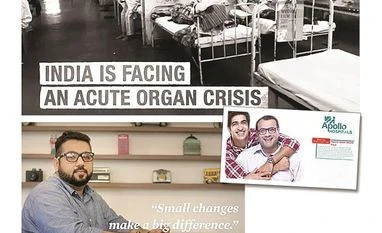‘Causevertising’ the term that has come to stand for advertisements around a social or political issue is a hit with brands across categories. But among the big converts to the cause have been health care brands in India. Through 2018, pharmaceutical companies, hospitals and allied services have associated with an assortment of causes, from organ donation to vaccination and visual impairment, to engage with consumers and build their corporate identities in a space that levies several restrictions on product communication.
Increased engagement with causes by the sector is also being seen as a fallout of the big creative wins that the category of health and pharma has seen at the Cannes Lions. In June, for the third year in a row, India won big in France with TBWA India bagging the Health Grand Prix at the Cannes Lions for its campaign called ‘Blink to speak’ for paralysed patients. Last year, McCann Health won for its campaign for the Afghanistan government called ‘Immunity Charm’ and in 2016, Medulla Communications was named the Health care Agency of the Year and won a gold for its campaign for palliative care.
Experts say that 2018 presented the perfect confluence of opportunities and imperatives: emergence of creative talent in health care communication, growing appeal of causevertising among young audiences on the one hand and the need for pharmaceutical companies and hospitals to build trust in their brands given the surge in controversies (think Fortis) on the other.
Jasrita Dhir, head of brand marketing and corporate social responsibility at Fortis Healthcare pointed out, health care spending is done when one is anxious; and there is seldom the opportunity to make an informed ‘purchase decision’. Therefore, brands need to be ‘top of the mind’. She adds that this is not necessarily done only through pure play advertising, but overall, marketing spends of hospitals will rise in the coming years.
Fortis Health care has been active on digital and television this year. It has increased the brand’s visibility around the cause of organ donation and like several others, Apollo Hospitals, Abbott India, Pfizer India and so on, has used storytelling techniques to push the cause. Most health care brands are staying away from product-led communication, finding their voice through life stories, instead. “We have used storytelling as a format and this works well to engage the consumer,” Dhir said.
Ambi Parameswaran, brand strategist and founder of Brand-Building.com and former CEO of FCB Ulka Advertising, said, “In health care, one cannot hardsell. One has to focus on image building and take an intellectual high ground.”
Abbott India, among the biggest advertisers in its sector in India, has been finding its way around the problems posed by the sector’s unique needs and government controls. It has been treading carefully around the rules to build its identity around therapies and common ailments rather than the medicines it sells. This is also a trust-building strategy point out the brands and experts. A spokesperson for Abbott India speaking to Business Standard earlier said, “People these days inherently want to trust the company that is making their products. Trust that they make them with quality. Nowhere is trust more critical than in health care.”
Pfizer India has chosen to associate with vaccination. Abbott’s latest campaign deals with diabetes, a chronic disease (chronic therapies are the focus area these days as compared to acute therapies). Interestingly, Abbott is not very active in the anti-diabetic therapy segment but the campaign revolves around the disease and its management, indicating perhaps that this may be an area of focus in the years to come.
Experts hint at an interesting shift in the narrative here. “Incentivising doctors has come under scrutiny. Companies are looking to reach out to the consumer directly. While there are restrictions on advertising molecules/medicines, one can always choose to advertise the company as a brand, provided one associates with a higher cause,” said an expert who has close to four decades of experience working with brands and advertising.
Earlier, the focus for pharma firms would advertise their over the counter (OTC) portfolio. For instance, this is how Mankind Pharma promoted its brands such as Manforce, Preganews etc. For Mankind, it especially made sense as their focus was on OTC and over 80 per cent of its turnover comes from the segment. Eventually, however, Mankind too has turned the spotlight on to its corporate identity, using endorser Amitabh Bachchan to tell the story of its brand and inspire trust among consumers.
Over 2019, most experts expect pharma and hospital brands to walk the trust talk, especially through their digital narratives where such messages tend to get amplified. “It makes a difference to have consumers recall the name of the manufacturer when one goes to buy medicines from a chemist. The same molecule is being sold by many, and the consumer is more likely to choose the one for which it has a better recall,” says Harish Bijoor, brand expert and CEO of Harish Bijoor Consults.
Unlock 30+ premium stories daily hand-picked by our editors, across devices on browser and app.
Pick your 5 favourite companies, get a daily email with all news updates on them.
Full access to our intuitive epaper - clip, save, share articles from any device; newspaper archives from 2006.
Preferential invites to Business Standard events.
Curated newsletters on markets, personal finance, policy & politics, start-ups, technology, and more.
)